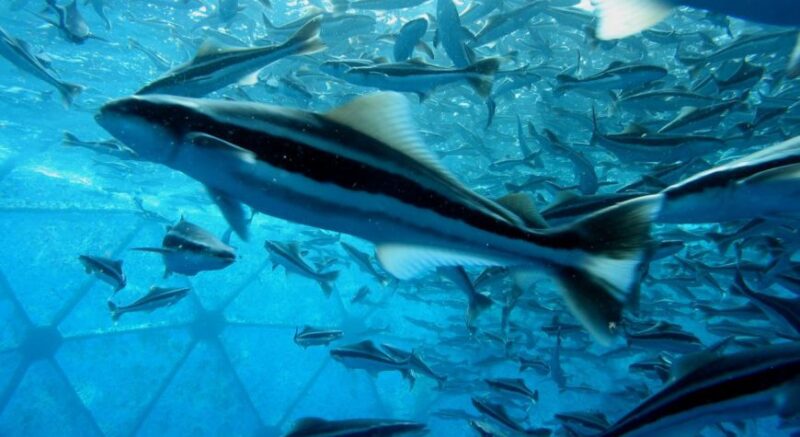Poll finds majority of US voters support aquaculture
As Canada dithers over the future of salmon farms in British Columbia, most Americans support aquaculture to increase sustainable seafood production.
By Fabian Dawson
SeaWestNews
A new American poll shows overwhelming support for the expansion of aquaculture in the United States as Canada remains in a fog of confusion over the future of fish farms, especially in British Columbia.
Stronger America Through Seafood (SATS), which commissioned the poll ahead of the Capitol Hill Ocean Week in Washington DC, said that a majority of voters support establishing a U.S. aquaculture industry to increase sustainable seafood production.
According to the survey of 1,020 likely voters conducted by Echelon Insights on May 20-23, 2022, the takeaways are:
- Two thirds of voters would feel more favorable towards a member of Congress who established pathways for offshore aquaculture.
- Over 6-in-10 voters (65% GOP, 67% Democrat) would feel more favorable toward their member of Congress if he or she were to support increased access to offshore opportunities for American businesses.
- Learning that the U.S. is missing opportunities for jobs and creating a strong economy drives 87% of voters to consider aquaculture important.
- Among voters, 84% support establishing a clear, predictable pathway for U.S. aquaculture when learning many American companies build aquaculture operations abroad, and 86% believe it’s important to expand U.S. aquaculture when learning the U.S imports most of its seafood.
- 86% of voters believe it’s important to expand U.S. aquaculture when learning that it’s a low impact means to feed a growing population, and 85% believe it’s important to expand U.S. when learning that aquaculture is a sustainable industry that provides climate-friendly protein from the ocean.
“Now is the time for Congress to act and put in place federal policies that would establish an aquaculture industry in U.S. federal waters – and the majority of voters agree,” said Sarah Brenholt, campaign manager of SATS
Aquaculture is the fastest-growing food production sector, supplying half of the seafood consumed globally, but the U.S. ranks only 16th in aquaculture production behind countries such as China, Indonesia, India, Vietnam, Bangladesh, South Korea, Egypt, Norway, and Japan, said SATS in a statement.
“The annual output of the American aquaculture industry, valued at $1.5 billion, is only 0.6% of the $263 billion global aquaculture market. As a result of the seafood deficit, the U.S. imports up to 85% of the seafood we consume, mainly from Asia and Europe.”
“The lack of a clear and predictable policy framework for permitting offshore aquaculture hinders growth of an American industry because it deters investment in the U.S. Federal legislation is needed to establish a policy framework that supports growth of American aquaculture production and creates a thriving U.S. aquaculture industry that can compete on the global stage,” said the organisation.
The poll reflects a similar survey done in Atlantic Canada where 81 percent of local residents said they support aquaculture and agree that local salmon farming is a reliable and sustainable source of protein.
In British Columbia, it’s a different story primarily because of a concerted, well-funded disinformation campaign to demonise open net salmon farming.
A poll last year from Insights West funded by The Pacific Salmon Foundation and Wild First, both of which vociferously oppose open-net salmon farming in BC, stated that most of those surveyed believe growing salmon in their natural environment needs to be transitioned to land-based pens using recirculating aquaculture system (RAS) technology.
However, the recent State of Salmon Aquaculture Technologies study has warned that land-based recirculating aquaculture system (RAS) technology requires the use of large amounts of land, water, and power, and thus has a significant environmental footprint, in particular greenhouse gas emissions.
Global fisheries, aquaculture and climate scientists have labelled the activism around moving all BC salmon farms to land based operations as unrealistic, reckless, and destructive because growing the global supply of salmon on land would require the same amount of energy per year needed to power a city of 1.2 million people and contribute to higher CO2 emissions. Raising land based Atlantic salmon also costs 12 times more than ocean farming, they said.
Moving the current production of Atlantic salmon to land based tanks on Vancouver Island will result in an increase 22,881,000 kgs of Greenhouse Gas (GhG) emissions, another recent study said. That is equivalent to the energy needed per year to power a population of 52,200 or a city the size of North Vancouver.
Moving to land-based salmon farming is not an option for aquaculture-dependent coastal indigenous communities in British Columbia, says a coalition of First Nations leaders.
“This very lack of understanding would lead to the loss of farms in our territories and the benefits that come with them. Many of our people would return to poverty, and as leaders, we cannot let that happen,” said the BC coalition of First Nations for Finfish Stewardship (FNFFS).
“Some Nations in this coalition have completed feasibility studies on land-based salmon farming in their territories for many years, and they came to the same result: it is not possible, and if it was, they would have moved to land-based salmon farming years ago,” FNFFS said.
The coalition’s statement comes as the government is set to make a decision on 79 salmon farming licences that are set to expire June 30. The Trudeau Liberals, pressured by activists and ignoring their own scientists, have made a pre-election promise to develop a plan by 2025 to transition all open net salmon farms on the west coast
(Image of a US fish farm courtesy of SATS)

